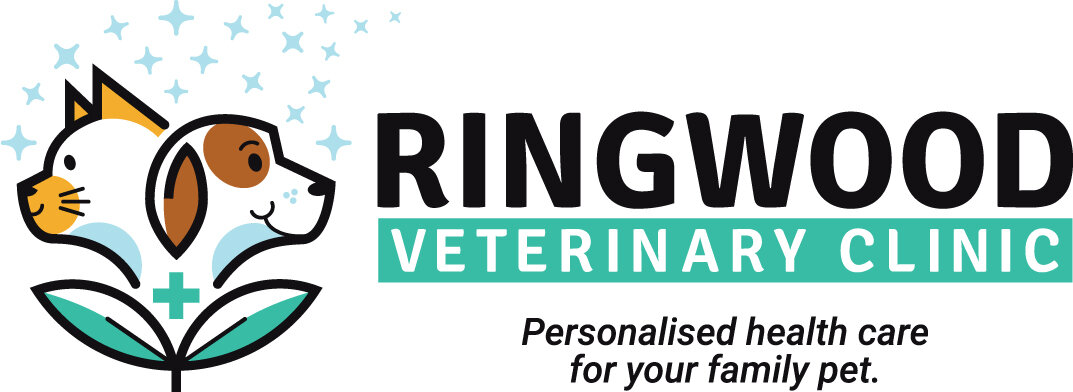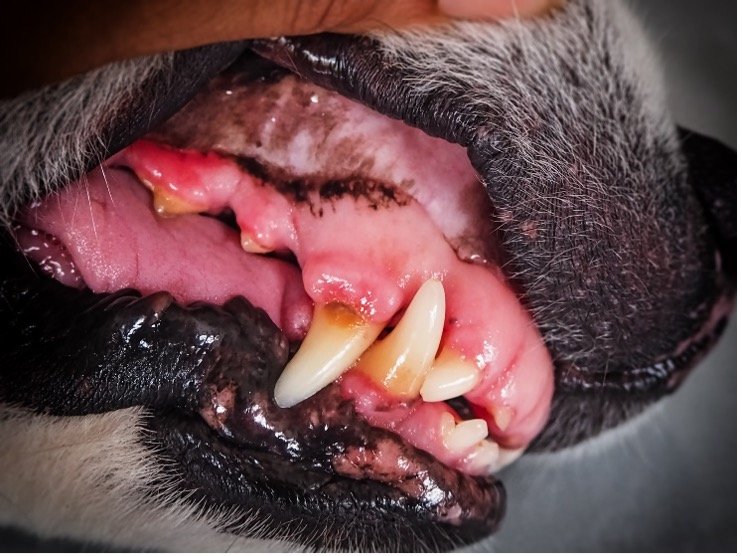How can periodontal disease hurt my pet?
Periodontal disease is inflammation and infection of the tissue surrounding the teeth, leading to tooth decay, chronic gum inflammation, and, if allowed to advance, tooth loss.
Dogs are particularly prone to gum inflammation, leading to destruction of the bone surrounding their teeth. This means older dogs, in particular, are more likely to lose important teeth they need to be in optimal health.
Periodontal disease in an older dog.
Periodontal disease can become very uncomfortable for your pet and will compromise their quality of life if you don’t take preventative measures and care for their teeth.
See our post on toothbrushing and dental hygiene routines to learn about caring for your pet’s teeth.
Are dogs more prone to dental disease than cats?
Ringwood Vet Clinic estimates that up to 80% of all cats and dogs they see have some form of periodontal disease.
Dogs are not more prone than cats but it’s more common for dogs to present at the vet with dental problems. It may be that dental disease is picked up more easily by dog owners, who can regularly look in their dog’s mouth and smell their breath. Cats are less likely to let you near their mouth.
Some smaller breeds of dog, such as Poodles, seem to have more dental problems. This is likely due to a genetic predisposition and perhaps because some owners are less likely to give raw bones to small dogs.
Brachycephalic dog breeds (with pushed in noses), such as Pugs and Boxers, are also known to have more dental problems because of the design of their mouths.
A Pug getting a routine dental check-up.
Can periodontal disease be life-threatening?
If a pet is finding it painful to eat as a result of periodontal disease (often they are older), they must be put under anaesthetic to have dental work done so they can eat comfortably. These increased risks can potentially turn life-threatening if your older pet’s dental disease is allowed to advance.
There’s some evidence that periodontal disease is linked to heart, kidney, or other disease within the body, as they often present together. More research is needed to fully understand the link.
What happens in a routine dental check-up?
Routine check-ups are done by a vet nurse who will have a good look in your pet’s mouth. They may show you how to care for your pet’s teeth properly and give you some valuable advice.
If the nurse sees advancing periodontal disease and feels that dental treatment is required, they will book you an appointment with a vet. All dental treatments, including cleaning, have to be done under anaesthetic with a vet.
If the vet thinks it’s warranted, they will also take an x-ray while your pet is under anaesthetic.
Act early and maintain a healthy mouth
If periodontal disease is detected, it’s best to do a dental treatment when the disease is mild. If you wait too long, it can cause irreversible damage, which puts your pet at high risk for more dental problems. You may end up with expensive, traumatic extractions of large teeth that your dog needs to remain in optimal health.
Strong, healthy teeth.
Protect your pet’s dental health from the start
Get them used to someone looking into and touching their mouths from when they are puppies and kittens.
Introduce them to pet toothpaste and a brush early on if you can.
Have a regular routine for dental care, whether it be brushing, raw bones, dental chews, gel or an approved dental diet.
Book them for a dental check-up every 6 to 12 months.
Ringwood Vet Clinic is offering 15% off all dental surgery and free dental check-ups for Pet Dental Awareness Month in August! Jump online and book your pet for a visit to see how their teeth are doing.



